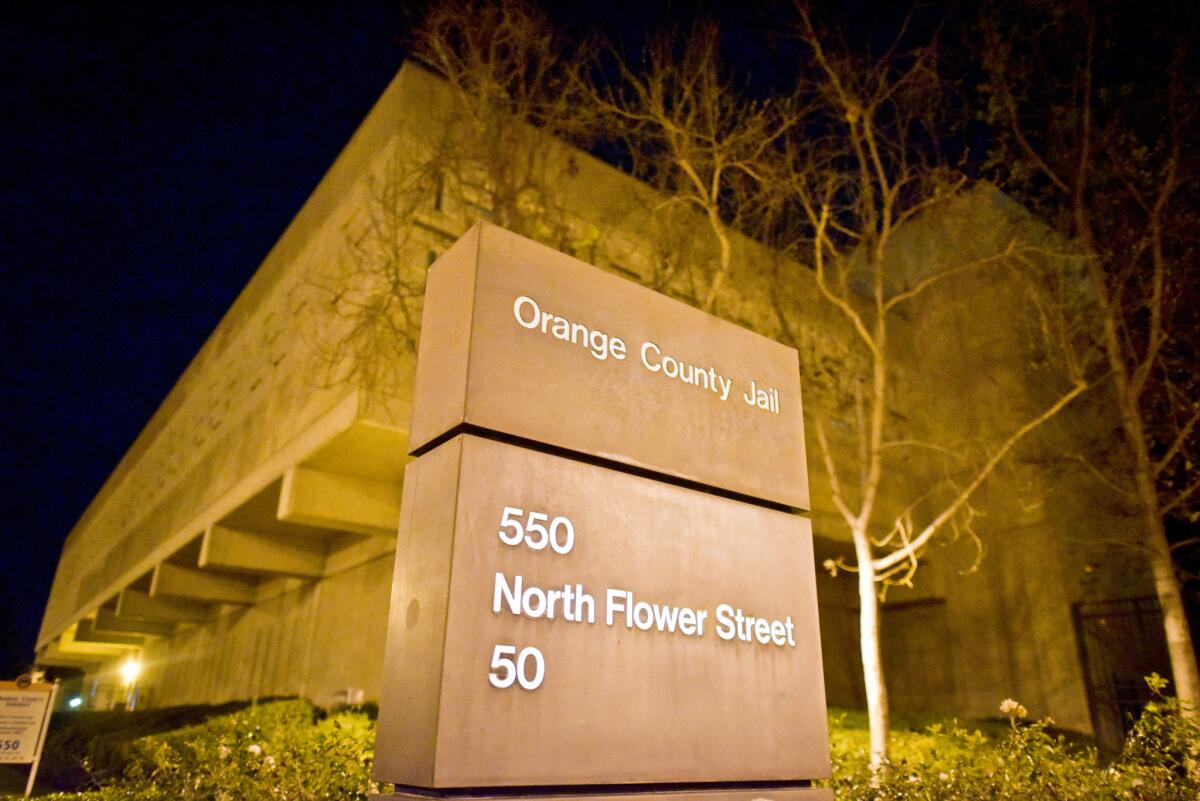U.S. Supreme Court blocks mandate requiring better coronavirus protections for Orange County inmates

- Share via
WASHINGTON — The U.S. Supreme Court on Wednesday freed Orange County jails from a federal judge’s order that required social distancing among inmates, regular testing and distribution of cleaning supplies and hand sanitizers.
Acting by a 5-4 vote, the justices granted an emergency appeal from the county’s lawyers and put on hold an order issued in late May by U.S. District Judge Jesus G. Bernal.
As usual, the justices in the majority did not explain their decision. The four liberal justices dissented. Justice Sonia Sotomayor said inmates had filed statements with the judge contradicting the claims of county jailers that CDC guidelines were being closely followed.
“This court normally does not reward bad behavior, and certainly not with extraordinary equitable relief,” she wrote in a dissent joined by Justice Ruth Bader Ginsburg. “Despite knowing the severe threat posed by COVID–19 and contrary to its own apparent policies, the jail exposed its inmates to significant risks from a highly contagious and potentially deadly disease.”
In its appeal two weeks ago, the county said it had released 2,300 inmates, or 53% of the total, in response to the pandemic, and asserted there is “currently zero transmission” of the virus inside the jails.
“There is no doubt that there are significant and dangerous outbreaks in some custodial institutions in this country. The Orange County Jails are not one of them, and the use of a federal injunction to micromanage their daily operations is unsupported in fact or law,” the county said in the case of Ahlman vs. Barnes.
Lawyers representing the inmates said Bernal’s intervention was crucial. They said inmates had been crowded together during the day, resulting in more than 300 inmates testing positive for the virus in late May. They said inmates had been “provided watered-down disinfectant and make-shift masks made from blood-stained sheets; and symptomatic detainees were being denied tests.”
Wednesday’s order is consistent with the court’s hands-off approach to disputes arising from the coronavirus.
Led by Chief Justice John G. Roberts Jr., the high court has issued a series of recent rulings that have told federal judges to defer to state and local officials involving elections, church gatherings and prisons.
Roberts was sharply criticized by his conservative colleagues and by religious rights advocates for decisions that left in place rules set by Democratic governors in Nevada, California and Illinois that limited the number of people at indoor church services.
He was also criticized by the liberal justices and progressives for decisions that blocked judges in Wisconsin, Texas and Alabama from relaxing Republican-led state election rules to make it easier for voters to cast ballots.
In all those cases, including three involving prisons, the chief justice voted for allowing state or local officials, not federal judges, to decide on how to handle the pandemic.
He explained his view in late May when the court, by a 5-4 vote, rejected a San Diego church’s challenge to an order by California Gov. Gavin Newsom that temporarily restricted church worship services to a maximum of 100 people. This rule did not discriminate based on religion, Roberts wrote, because “similar or more severe restrictions apply to comparable secular gatherings, including lectures, concerts, movie showings, spectator sports, and theatrical performances, where large groups of people gather in close proximity for extended periods of time.”
“The precise question of when restrictions on particular social activities should be lifted during the pandemic is a dynamic and fact-intensive matter subject to reasonable disagreement. Our Constitution principally entrusts the safety and the health of the people to the politically accountable officials of the states to guard and protect,” he wrote in South Bay United Pentecostal Church vs. Newsom. In general, their rules “should not be subject to second-guessing by an unelected federal judiciary, which lacks the background, competence, and expertise to assess public health and is not accountable to the people.”
In the case of the Orange County jails, Roberts joined Justices Clarence Thomas, Samuel A. Alito Jr., Neil M. Gorsuch and Brett M. Kavanaugh to grant the appeal.
More to Read
Get the L.A. Times Politics newsletter
Deeply reported insights into legislation, politics and policy from Sacramento, Washington and beyond. In your inbox three times per week.
You may occasionally receive promotional content from the Los Angeles Times.










